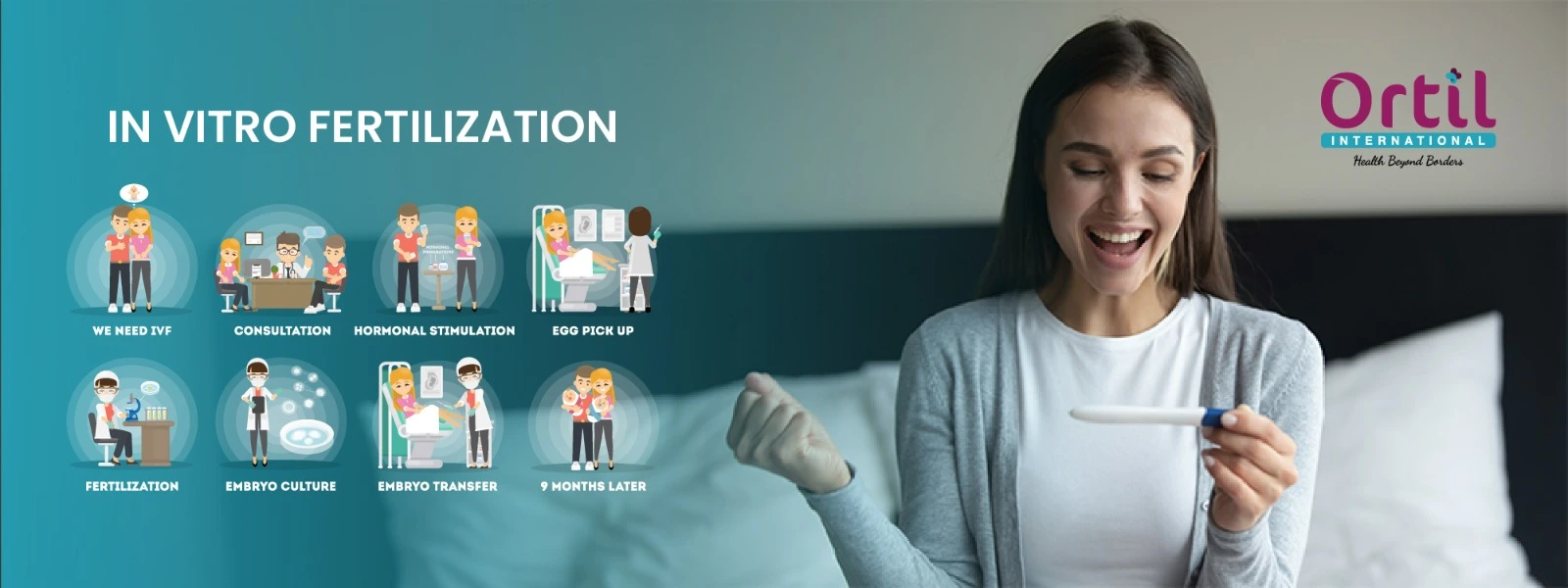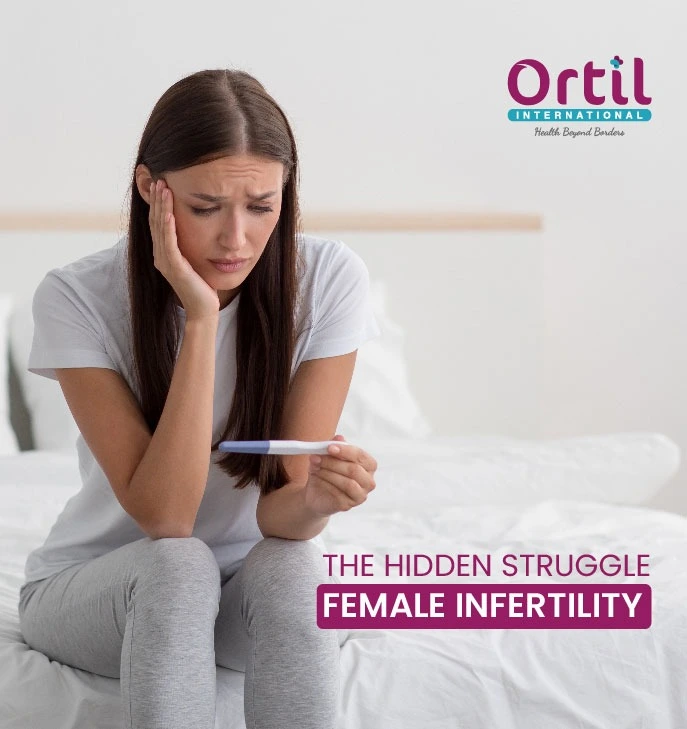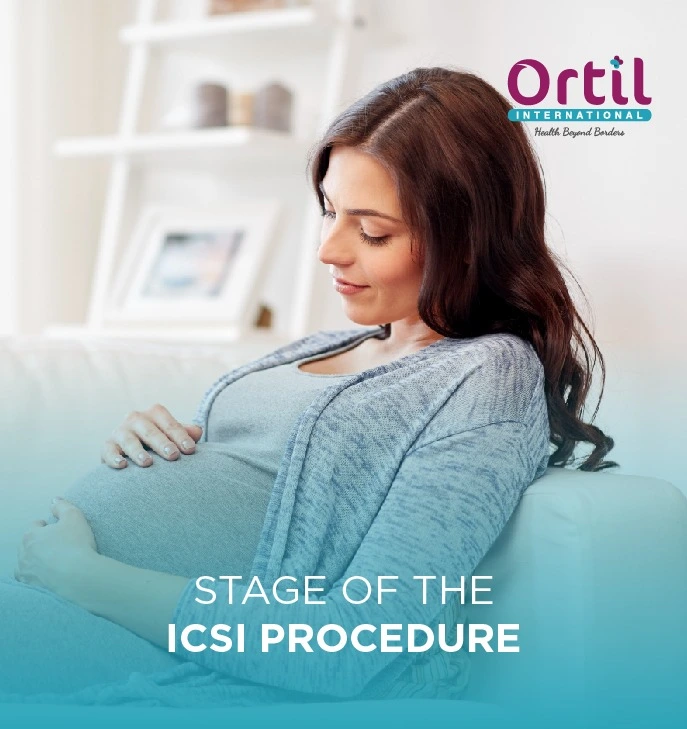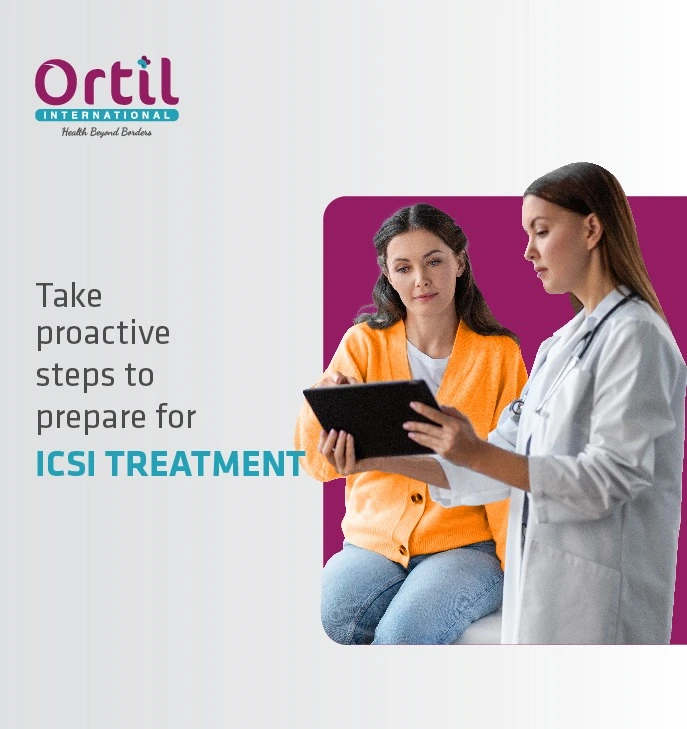Step By Step Guide to IVF Infertility and IVF Treatment

Infertility is the inability of a person to make babies. In vitro fertilization is one of the early common fertility treatments.
While you're probably familiar with the basic concept of in vitro fertilization (IVF), which involves combining eggs and sperm outside of the body in a laboratory setting, there are other additional steps to follow before and after IVF treatment.
What does IVF stand for?
IVF stands for In Vitro Fertilization process which is used as one of the fertility treatments for couples.
What is IVF?
IVF is a medical procedure for those who have difficulty in getting pregnant. In IVF, the egg from a woman is extracted and sperm from a man is collected. Then the fusion of egg and sperm takes place IN the laboratory, that’s why we call it In Vitro Fertilization which means ‘fertilization outside the body’. The fusion of the egg and sperm form an embryo which is then allowed to grow in the suitable environment of the laboratory.
When all the possible treatments and all the attempts to get you pregnant failed, IVF is performed. IVF does not guarantee you the pregnancy but it can give you the hope of becoming parents. Here are some of the reasons why you can go for IVF.
Infertility
IVF can assist individuals or couples who have difficulty conceiving naturally due to factors such as blocked fallopian tubes, low sperm count or quality, ovulation disorders, or unexplained infertility.
Advanced Maternal Age
As women age, the quality and quantity of their eggs decline, making conception more challenging. If you are a woman of older age and finds it difficult to conceive then IVF may be the option for you.
Single Individuals
The single individuals who want their biological child also use the IVF treatment.
Preserved Fertility
If you are diagnosed with some disease and need an aggressive kind of treatment that may affect your fertility, then IVF method is used to preserve the mature eggs or embryos for future use.
Unsuccessful Previous Treatments
If other methods of fertility such as natural method or intrauterine insemination fails, IVF may be recommended.
What are the Steps of IVF Treatment?
Here is the IVF procedure step by step:
Ovarian Stimulation
This phase involves taking medication to stimulate the ovaries to produce multiple eggs rather than the single egg that is released during a natural menstrual cycle.
Monitoring
During ovarian stimulation, regular monitoring is performed through blood tests and ultrasounds to check the growth of ovarian eggs. The dosage of medications can also be adjusted according to need.
Egg Retrieval
Once the follicles have reached an appropriate size, an egg retrieval procedure is performed. This is typically done under the effect of anesthesia. After the procedure, some rest and recovery time may be needed.
Fertilization
The mature egg and the sperm of your partner fused together either by conventional method or by injecting the sperm into your egg. This is done in the laboratory.
Embryo Transfer
After 5 days, the embryo formed in the laboratory is implanted into your uterus for further development.
Post-Transfer
after the embryo transfer, there is a waiting period of about 15 days. After you're done, your pregnancy test will confirm the success of IVF treatment.
How Long is the IVF Process from Beginning to the End?
The IVF process can take several weeks before the final success. The duration depends on the individual circumstances and the treatment protocols. However, here is the description of each step’s time.
Ovarian Stimulation: the use of medications of ovarian stimulation usually lasts around 8-14 days.
Egg Retrieval: the mature egg is extracted from the body by a procedure that takes 20-30 minutes.
Embryo Transfer: after 3-5 days of fusion of egg and sperm, the embryo is transferred to the woman's body. It takes 15-20 minutes.
Post-Transfer Waiting Period: after the embryo transfer, there is a waiting period of about 10-14 days. After that time pregnancy test is done to check if the IVF was successful or not.
What is the Difference Between IVF and IUI?
IVF (In Vitro Fertilization) and IUI (Intrauterine Insemination) are two different techniques that are used to treat infertility. Both of these methods are used to help you in conceiving but there are prominent differences between them in terms of procedure and success rates.
What is IUI?
IUI involves the introduction of washed and concentrated sperm directly into a woman's uterus. In IUI, your partner’s sperms are collected and healthy sperms are stored for a while. When the ovulation period comes in your menstrual cycle, the collected sperms are injected directly into your uterus.
Why is it different from IUI?
IVF involves the fertilization of eggs with sperm in a laboratory setting before transferring the resulting embryos back into your uterus. So in IUI, the fertilization occurs in your own body but in IVF the fertilization of sperm and egg takes place in the laboratory.
What Do You do to Prepare for IVF Treatment?
In Preparation of IVF treatment, you should consult a fertility specialist, and go for medical evaluations, and make some lifestyle adjustments. Medications and hormone injections are used to stimulate the ovaries. Your partner’s Sperm and your eggs are prepared, and pre-implantation genetic testing may be done. Emotional support and counseling are important throughout the process. Once eggs are retrieved and fertilized, embryos are cultured before transfer. Medications are given to prepare your uterus, and the painless embryo transfer takes place. It's essential to follow individualized protocols and maintain open communication with the fertility specialist for your successful IVF journey.
What Medications are Used for IVF?
Medications used in IVF include: GnRH agonists, GnRH antagonists, FSH analogs, hCG, progesterone, and estrogen.
- GnRH agonists and antagonists suppress premature ovulation.
- FSH analogs stimulate follicle development.
- hCG triggers egg maturation.
- Progesterone supports the uterine lining for implantation of the embryo.
- Estrogen may be used to optimize it.
Dosages and protocols are based on individual factors. Consult your fertility specialist for personalized guidance and medication regimens in IVF.
What are the Risks of IVF?
IVF (In Vitro Fertilization) may have certain risks that you should consider. You can have multiple pregnancies which can be a complication for you and your babies. Another risk is that your ovaries may swell and cause pain due to the effect of medicines.
There are also the chances of infection when you are undergoing the process of egg retrieval. In rare cases, IVF may happen to cause ectopic pregnancy or even miscarriage.
It is important for you to thoroughly discuss the whole process and the pros and cons with your healthcare professional to fully understand these risks.
What are the Most Common Side Effects of IVF?
Side effects of IVF can be different from each individual. You may experience some or all of the following side effects:
- Bloating
- Abdominal discomfort
- Breast tenderness
- Mood swings
- Headache
- Fatigue
- Allergic reactions
- Hot flashes
- Mild pelvic pain.
It's important for you to consult with your healthcare provider on how to manage these side effects effectively.
How Effective is IVF in Getting Pregnant?
IVF is a highly effective method for couples trying to achieve pregnancy. The success rates of IVF usually depend on many factors. The chances of success can be affected by your age at the time of receiving IVF treatment, the quality of your embryo, and the reason behind your infertility.
In general, IVF has a success rate of around 30% to 50% per cycle.
How Long Does it take to Know You are Pregnant after IVF?
After IVF, it typically takes around two weeks for an accurate pregnancy confirmation. This is known as the two-week wait. This period allows the embryo to implant and release hCG. Most clinics recommend taking a blood test or urine test 10 to 14 days after the embryo transfer. Blood tests are more sensitive, while home urine tests can be used earlier but may yield false negatives. After this waiting period, you may know the result and the success of IVF.
Contact your healthcare provider if you have a positive or negative pregnancy test, experience unusual symptoms, have concerns about medications, need emotional support, miss a period, or have any other questions or concerns regarding your IVF treatment.
Is there anything I can do to increase my chances of pregnancy with IVF?
To potentially increase your chances of pregnancy with IVF:
- Follow medical advice diligently.
- Maintain a healthy lifestyle with a balanced diet and exercise.
- Avoid smoking and excessive alcohol consumption.
- Consider acupuncture as it may enhance outcomes.
- Seek emotional support and manage stress effectively.
While these steps can be beneficial, success cannot be guaranteed. Discussing your specific situation with your healthcare provider is important for personalized guidance.
What is the Success Rate of IVF by Age?
Here are approximate success rates based on age categories:
| Under 35 |
40% to 50% per IVF cycle |
| 35-37 |
30% to 40% per IVF cycle |
| 38-40 |
20% to 30% per IVF cycle |
| 41-42 |
10% to 20% per IVF cycle |
| Over 42 |
10% per IVF cycle |
FAQ's of IVF Infertility and IVF Treatment
What age is IVF most successful?
The IVF is mostly successful under the age group of 35 years.
Is in vitro fertilization healthy?
In vitro fertilization (IVF) is generally considered a safe and effective fertility treatment.
How much does IVF cost in India?
The cost of IVF in India ranges from 700-900 USD.
Is IVF procedure painful?
You may experience some mild to moderate discomfort or no pain during IVF procedure.
Which hospital is best for IVF in India?
The following hospitals are best for IVF treatment in India:
- Apollo Hospitals, Chennai
- Manipal Hospitals, Bengaluru
- Fortis Memorial Research Institute, Gurugram
- Nova IVF Fertility
How safe is IVF in India?
IVF safety in India depends on the skill of the practitioner, treatment protocols, and the qualifications of medical professionals.
Why is in vitro fertilization used?
In Vitro fertilization is used as one of the infertility treatments. It is used by couples who are suffering from infertility due to any reason.
Can you choose gender with IVF?
The majority of countries including India only allow gender selection through IVF for medical or genetic reasons, such as the risk of certain genetic disorders that are linked to a specific gender
Are IVF babies normal?
Yes, children conceived through in vitro fertilization (IVF) are usually normal in terms of their health.


























